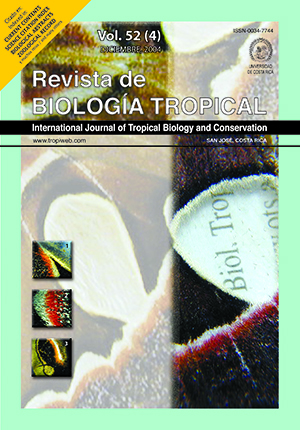Abstract
Centrostephanus coronatus reaches a density of 0.06 individuals/m2 in shallow reef waters in Parque Nacional Marino Ballena, Pacific of Costa Rica, in the same habitat occupied by the urchin Diadema mexicanum. It is the fourth species of diadematoid urchins reported for Costa Rican and a first new report for Central America.References
Brusca, R.C. 1980. Common Intertidal Invertebrates of the Gulf of California. University of Arizona, Phoenix. 513 p.
Carreiro-Silva, M. & T.R. McClanahan. 2001. Echinoid bioerosion and herbivory on Kenyan coral reefs: the role of protection from fishing. J. Exp. Mar. Biol. Ecol. 262: 133-153.
Clark, H.L. 1948. A report on the Echini of the warmer eastern Pacific, based on the collections of the Velero III. Allan Hancock Pac. Exp. 8: 225-352.
Cortes, J. & J.J. Alvarado. in press. Echinodermata. In I. Wehrtman & J. Cortes. Marine Biodiversity of Costa Rica. Kluver Academic.
Fischer, R. 1990. Biogenetic and nonbiogenetically determined morphologies of the Costa Rican Pacific coast. Z. Geomorph. N. F. 34: 313-321.
Guzmán, H.M. 1988. Distribución y abundancia de organismos coralívoros en los arrecifes coralinos de la Isla del Caño, Costa Rica. Rev. Biol. Trop. 36: 191-207.
Hickman, Jr., C.P. 1998. A Field Guide to Sea Stars and Other Echinoderms of Galápagos. Sugar Spring, Lexington, Virginia. 83 p.
Lessios, H.A., B.D. Kessing, G.M. Wellington & A. Graybeal. 1996. Indo-Pacific echinoids in the tropical eastern Pacific. Coral Reefs 15: 133-142.
Toro-Farmer, G., J.R. Cantera K., E. Londoño-Cruz, C. Orozco & R. Neira O. 2004. Patrones de distribución y tasas de bioerosión del erizo Centrostephanus coronatus (Diadematoidea: Diadematidae), en el arrecife de Playa Blanca, Pacífico colombiano. Rev. Bio. Trop. 52(1): 67-76.
Vázquez-Domínguez, E. 2003. Diversidad y distribución de crustáceos y equinodermos y su relación con niveles de sedimentación en arrecifes coralinos. Rev. Biol. Trop. 51: 183-194.
Comments

This work is licensed under a Creative Commons Attribution 4.0 International License.
Copyright (c) 2004 Revista de Biología Tropical


